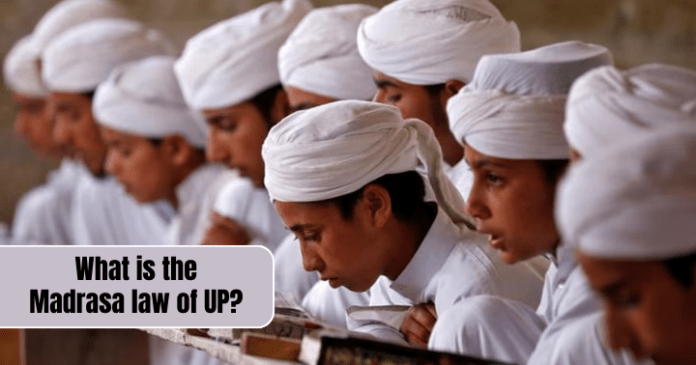The Supreme Court on Friday stayed the decision of the Allahabad High Court, in which the court had ordered to repeal the Madrasa law in UP. On March 22, the High Court had given its decision to repeal the Madrasa Act 2004.
This was challenged in the Supreme Court. The Supreme Court has also issued a notice to the Central and UP governments regarding this.
Madrasa law will not be cancelled : SC
Madrasa law of Uttar Pradesh will not be cancelled yet. The Supreme Court has stayed the decision of Allahabad High Court. The High Court had recently cancelled this law, saying it was against the principle of secularism. On this, the Supreme Court said that the High Court had misunderstood the law.
Chief Justice DY Chandrachud, Justice JB Pardiwala and Justice Manoj Mishra, said that the Allahabad High Court has made a mistake in understanding some provisions of the law.
On March 22, the High Court had repealed the UP Board of Madrasa Education Act 2004, calling it unconstitutional and a violation of the principle of secularism.
But now the Supreme Court has stayed the decision of the High Court. This means that madrassas will continue to function in UP. The decision of the Supreme Court has brought great relief to 17 lakh students studying in madrassas.
What happened in the Supreme Court?
The decision of Allahabad High Court was challenged in the Supreme Court by the Madrassa Managers Association. On behalf of the organization, senior advocate Abhishek Manu Singhvi argued in the Supreme Court that madrassas have been running for 120 years and sudden closure will affect 17 lakh students and 10 thousand teachers.
On the High Court’s argument that modern subjects are not taught in madrassas, Singhvi said that subjects like Maths, Science, Hindi, English are also taught here. It is wrong to believe that only religious education is given in madrassas.
Singhvi also argued that there are very famous Gurukuls in Haridwar and Rishikesh, which are doing good work. My father also has a degree from there. Will you close them down saying that religious education is being imparted there?
At the same time, Attorney General K, appearing for the Centre. Venkataramani said that the only effect of the repeal of this law will be that madrassas will not get any government aid. On behalf of the UP government, ASG Nataraj said that the government will not close any madrassa. He said that the government provides assistance of Rs 1,096 crore to madrassas every year.
What did the Supreme Court say?
The bench led by CJI Chandrachud said that the High Court has misinterpreted the provisions of the Madrasa Act, because it does not impart religious education.
The court said, ‘Madrasa Board can be regulated and it is not prima facie correct for the Allahabad High Court to say that the formation of the Board will violate secularism.’
The court said that if the High Court was concerned that those studying in madrassas should also get quality education, then the solution would not be found by repealing the Madrassa law. Instead of doing this, proper guidelines will have to be issued, so that students are not deprived of quality education.
The bench further said that the High Court order will affect the future of 17 lakh children. In our view, prima facie this decision was not right.
During this, Additional Solicitor General (ASG) KM Nataraj, appearing on behalf of the UP government, said that the state government has accepted the decision of the High Court.
On this, CJI Chandrachud asked that despite defending your law in the High Court, why are you not defending the law here. Responding, ASG Nataraj said that after the High Court’s decision, the government chose to approve it.
Why did the High Court cancel the law?
A person named Anshuman Singh Rathod had filed a petition in the Allahabad High Court against the Madrasa Board Act. Rathore had challenged the constitutional validity of this law.
The High Court had given its verdict on this on March 22. The High Court had said that the UP Board of Madrasa Education Act 2004 is ‘unconstitutional’ and violates the principle of secularism. Also, the state government was ordered to include the children studying in madrassas in the general schooling system.
Allahabad High Court had said, ‘The Madrassa Act 2004 is a violation of the principle of secularism, which is part of the basic structure of the Constitution of India.’
The court had also said that the government does not have the authority to create a board for religious education or to create a board for school education for any particular religion.
What is Mad What is the Madrasa law of UP?
This law was made in Uttar Pradesh in 2004. Under this, Madrasa Board was formed. Its purpose was to organize madrassa education. In this, education like Arabic, Urdu, Persian, Islamic Studies, Tibb (Traditional Medicine), Philosophy has been defined.
There are 25 thousand madrassas in UP, out of which about 16 thousand are recognized by the UP Board of Madrassas. There are eight and a half thousand madrassas which have not been recognized by the Madrassa Board.
Madrasa Board awards under graduation degree under the name of ‘Kamil’ and post graduation degree under the name of ‘Fazil’. Under this, diploma is also done, which is called ‘Kari’. The board also conducts Munshi, Maulvi (10th class) and Aalim (12th class) examinations every year.
Now what next?
At present, the Supreme Court has put an interim stay on the decision of Allahabad High Court. Along with this, the court has also issued notice to the Central and UP governments.
The Supreme Court has given time to UP and Central Government to file their reply till 30 June 2024. After this, the hearing will be held in the second week of July.

